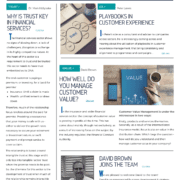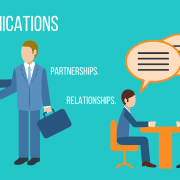Customer management in a world of intermediaries and brokers – “Experts that sell – does it work”?
In the second of our series of articles exploring various issues in the intermediated world of financial services, “Expert salesmen or experts who can sell?” we looked at various options for building capability that combined technical expertise with sales and account management skills. We subsequently received several enquiries asking how different industries have tackled this issue. This case study is based upon a programme developed for a large global engineering company and provides the how and the upside from deploying a programme that builds capability within your experts and technical specialists to effectively sell.
What was the issue / need
This organisation working within complex B2B relationships posed us a challenge;
“We have a sales team that are more akin to engineers / technical experts than sales people. Little training has been given to them, yet we expect them to sell within increasingly demanding customer relationships. In pursuit of professionalisation our customer base increasingly involve procurement within the decision making process. No longer can we rely on their relationships with the engineers/technical specialists to write the specification and gain the order. They also need to be able to sell and deal effectively with procurement and multiple stakeholders.”
Something had to change as commoditisation and margin erosion needed to be reversed.
What’s the Solution?
Do you train the experts to sell and become more commercial or train sales people to become experts? Given the complexity and technical requirement, in this instance, it was more effective to train and develop sales and commercial capability within the experts. However, it needed to be right for the organisation and an off the shelf solution just wouldn’t work.
To meet this need the following approach was developed;
- Commercial competency set developed and agreed
- Competency set used as the framework to the gaps and set the programme start point
- Champions from within the team/divisions and countries identified and enrolled to work on co-creating the solutions, co-delivering the solutions, role modelling and embedding the changes required.
- Senior leadership set up as the steering group to sign off championed developed content and support the embedding process.
- Six solutions were identified and developed;
- Selling in a price based market
- Selling added value
- Planning for growth
- Everyday negotiation
- New business development
- Advanced / strategic negotiation
- All the materials, case studies and examples were bespoke to the organisation. Multi –mediums were employed and deployed, with highly interactive experience events to transfer / embed key sections from each module.
- Material was circulated two weeks prior to the experience event and failure to download the material resulted in removal from the programme.
- Each event was run from an understanding of base knowledge developed through the pre-learning.
- Champions were trained ahead of the experience events and expected to lead at least one module.
- The executive / steering group received a three hour condensed version or attended the experience events to ensure they could follow up effectively.
- Refreshers were re-run through champions as required
- KPI dashboard measured the programme against hard and soft metrics, developed from a behaviours perspective.
Programme highlights
- Return on Investment of circa 15:1
- Ability to realise a premium of between 5~7%, due to added value from the expert sales team.
- Access to the customer technical experts, ‘shop floor’ and ability to spot the competition in early trail / development phase and added value opportunities.
- Ability to sell co-creation , product and solution development both internally within the organisation and externally within the customer.
- Achievement of key customer strategic supplier status.
- Overall uplift in sales team commercial competence as measured through the competency framework.
- Sales team stability and consistency.
- Internal transfer of the programme as it continues to be delivered through the champions.
This is one example of how experts can become empowered once given the right support and development.
In the intermediated business model common across financial services, the parallels to the challenge faced by our client are striking. Both the end client and the intermediary expect a high degree of technical knowledge, and often bypass the sales force to get their answers from the underwriter.
At Customer Attuned, we have real experts in the area of B2B account management and commercial development, combined with financial services expertise. We have experience of working with clients who have faced the challenges outlined above and developed the solutions that met their need. Your solution needs to be matched to the requirements of your customers and the capability of your organisation to deliver. If you would like to know more please contact.
Alan Thompson; Head of Financial Services
E: alan.thompson@customerattuned.com
Mark Hollyoake; Head of Customer Attuned Assessment (CAA) ©
E: mark.hollyoake@customerattuned.com
- Great insights shared by cross sector business leaders - February 27, 2024
- Strategic Account Management Training – the importance of reflection - February 1, 2024
- Building a High Performing Account Management Team - November 28, 2023





